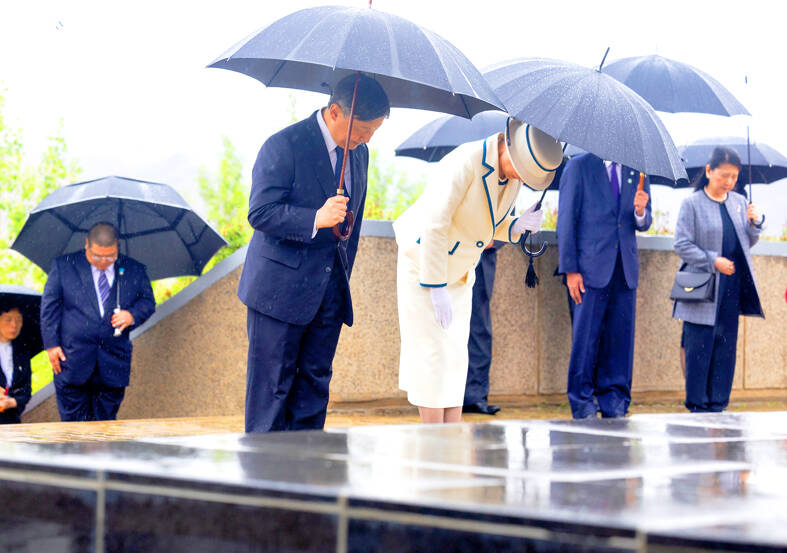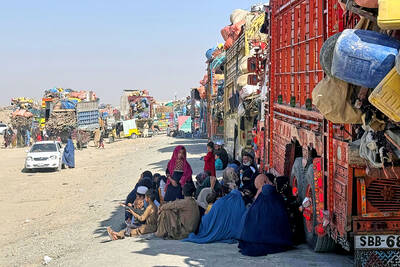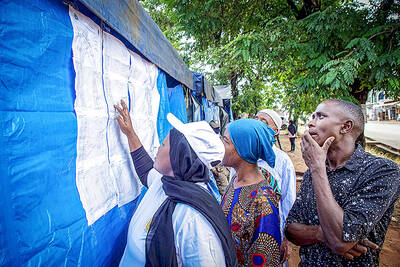Japanese Emperor Naruhito met with Mongolian President Ukhnaagiin Khurelsukh yesterday during a visit to the landlocked Asian nation that marks a step toward closer relations between the democracies in a region dominated by Russia and China.
Naruhito met with Khurelsukh following a welcoming ceremony in the capital, Ulan Bator, on the second day of a week-long visit.
Japan has made a priority of boosting trade with the sprawling nation of 3.5 million, whose resources of coal, copper and other minerals are largely exported to China.

Photo: EPA
In the afternoon, Naruhito and Japanese Empress Masako laid flowers at a cenotaph in honor of thousands of Japanese prisoners of World War II who were held under harsh conditions in the country. Naruhito’s visit marks the 80th anniversary of the end of the war.
Some historians say one of the first battles of the war was a clash in the summer of 1939 between invading Japanese troops and Soviet forces on the Mongolian frontier in which the Japanese were badly defeated.
In recent years, Naruhito has toured some of the places where the bloodiest battles and bombings of World War II occurred, including Iwo Jima, Okinawa and Hiroshima.
The emperor has said it is part of his effort at atonement and remembrance of the tragedy of war fought in the name of his grandfather, former emperor Hirohito. While the vast majority of Japanese prisoners of war were taken to Siberia, about 12,000 to 14,000 ended up in Mongolia, which by war’s end was fighting alongside the Russians against Japan. For decades after the war, Mongolia was virtually a Soviet armed camp, with most of its people pursuing their traditional herding lifestyle.
Since throwing off communist rule in 1989, Mongolia has built a resilient democracy, seeking to balance economic and political pressures from Beijing and Moscow with strong support from the US and its allies in Asia, including Japan and South Korea.

With much pomp and circumstance, Cairo is today to inaugurate the long-awaited Grand Egyptian Museum (GEM), widely presented as the crowning jewel on authorities’ efforts to overhaul the country’s vital tourism industry. With a panoramic view of the Giza pyramids plateau, the museum houses thousands of artifacts spanning more than 5,000 years of Egyptian antiquity at a whopping cost of more than US$1 billion. More than two decades in the making, the ultra-modern museum anticipates 5 million visitors annually, with never-before-seen relics on display. In the run-up to the grand opening, Egyptian media and official statements have hailed the “historic moment,” describing the

‘CHILD PORNOGRAPHY’: The doll on Shein’s Web site measure about 80cm in height, and it was holding a teddy bear in a photo published by a daily newspaper France’s anti-fraud unit on Saturday said it had reported Asian e-commerce giant Shein (希音) for selling what it described as “sex dolls with a childlike appearance.” The French Directorate General for Competition, Consumer Affairs and Fraud Control (DGCCRF) said in a statement that the “description and categorization” of the items on Shein’s Web site “make it difficult to doubt the child pornography nature of the content.” Shortly after the statement, Shein announced that the dolls in question had been withdrawn from its platform and that it had launched an internal inquiry. On its Web site, Le Parisien daily published a

‘NO WORKABLE SOLUTION’: An official said Pakistan engaged in the spirit of peace, but Kabul continued its ‘unabated support to terrorists opposed to Pakistan’ Pakistan yesterday said that negotiations for a lasting truce with Afghanistan had “failed to bring about a workable solution,” warning that it would take steps to protect its people. Pakistan and Afghanistan have been holding negotiations in Istanbul, Turkey, aimed at securing peace after the South Asian neighbors’ deadliest border clashes in years. The violence, which killed more than 70 people and wounded hundreds, erupted following explosions in Kabul on Oct. 9 that the Taliban authorities blamed on Pakistan. “Regrettably, the Afghan side gave no assurances, kept deviating from the core issue and resorted to blame game, deflection and ruses,” Pakistani Minister of

UNCERTAIN TOLLS: Images on social media showed small protests that escalated, with reports of police shooting live rounds as polling stations were targeted Tanzania yesterday was on lockdown with a communications blackout, a day after elections turned into violent chaos with unconfirmed reports of many dead. Tanzanian President Samia Suluhu Hassan had sought to solidify her position and silence criticism within her party in the virtually uncontested polls, with the main challengers either jailed or disqualified. In the run-up, rights groups condemned a “wave of terror” in the east African nation, which has seen a string of high-profile abductions that ramped up in the final days. A heavy security presence on Wednesday failed to deter hundreds protesting in economic hub Dar es Salaam and elsewhere, some